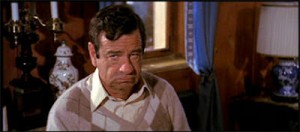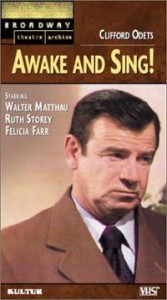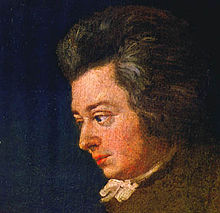 “A thing is not necessarily true because a man dies for it.”
“A thing is not necessarily true because a man dies for it.”
Oscar Wilde, “The Portrait of Mr. W.H.”
Terry Teachout on the arts in New York City
 I’ve been thinking about Walter Matthau, one of my all-time favorite movie stars and among the very few character actors—Edward G. Robinson was another—who managed to become an above-the-title leading man in spite of the fact that he wasn’t conventionally attractive. I once considered writing a lengthy essay about Matthau, but his offstage life was insufficiently interesting or eventful (he was a near-degenerate gambler who liked classical music and spent most of his time making movies) to justify extended treatment. Moreover, I soon realized that I’d already written that piece, more or less, when I wrote about Robert Mitchum for Commentary.
I’ve been thinking about Walter Matthau, one of my all-time favorite movie stars and among the very few character actors—Edward G. Robinson was another—who managed to become an above-the-title leading man in spite of the fact that he wasn’t conventionally attractive. I once considered writing a lengthy essay about Matthau, but his offstage life was insufficiently interesting or eventful (he was a near-degenerate gambler who liked classical music and spent most of his time making movies) to justify extended treatment. Moreover, I soon realized that I’d already written that piece, more or less, when I wrote about Robert Mitchum for Commentary.
Like Mitchum, Matthau was the quintessential example of a greatly gifted artist who didn’t take his art seriously enough to challenge himself. He played leading roles in a dozen Broadway plays, virtually all of which were flops, before finally hitting the jackpot in 1965 with Neil Simon’s The Odd Couple. After that, he never again appeared on the New York stage, preferring to make vast amounts of money in Hollywood, most of which he gambled away. Nor did he ever make a film remotely as distinguished as Charles Laughton’s The Night of the Hunter, which left no possible doubt of Robert Mitchum’s ability to grapple with uncompromisingly serious material. “Listen, for twenty-five years I’ve been a serious actor,” Matthau had told Mike Nichols at an Odd Couple rehearsal. “Now, I want to be a popular actor.” So he spent the rest of his life making genre films of various kinds, and though a few of them, including Charley Varrick, Hopscotch, House Calls, I.Q., A New Leaf, The Taking of Pelham One Two Three, and (of course) the screen version of The Odd Couple, are memorable, most were instantaneously forgettable.
On three widely separated occasions, Matthau appeared in TV versions of major plays, Clifford Odets’ Awake and Sing!, Sean O’Casey’s Juno and the Paycock, and Othello, in which he played Iago, his only Shakespearean role. Toward the end of his life, he singled out the last of these appearances as the highlight of his career: “Most of my work is crap, I’m waiting for something good. I did a good thing in 1952, on the Philco Playhouse. I played Iago. That I liked.” But while he talked at odd intervals about returning to the stage—he actually claimed to have given some thought to trying his hand at Lear—he only followed through once, doing Juno in Los Angeles in 1974. From then on he usually settled for throwaway films like The Odd Couple II.
 Every artist has a right to be judged by his best work, and by that standard Matthau still has a strong claim on the attention of anybody who cares about good acting. He was an immensely charismatic and knowing craftsman with a much wider range than is commonly acknowledged, and his nasal, gravelly whine and basset-hound face always added value to the drossiest of the films in which he starred. Yet I can’t help but recall what David Thomson wrote about him in his Biographical Dictionary of Film: “There’s something sad in that Matthau’s occasional appearances on talk shows—poker-faced, piss-eloquent, a collection of anecdotes and disguises—were invariably more interesting than his pictures.”
Every artist has a right to be judged by his best work, and by that standard Matthau still has a strong claim on the attention of anybody who cares about good acting. He was an immensely charismatic and knowing craftsman with a much wider range than is commonly acknowledged, and his nasal, gravelly whine and basset-hound face always added value to the drossiest of the films in which he starred. Yet I can’t help but recall what David Thomson wrote about him in his Biographical Dictionary of Film: “There’s something sad in that Matthau’s occasional appearances on talk shows—poker-faced, piss-eloquent, a collection of anecdotes and disguises—were invariably more interesting than his pictures.”
Even more to the point is a conversation that John Williams, the Star Wars man, once reported having had with Bernard Herrmann:
He was never flattering, but he encouraged me. In the early sixties I wanted to write a symphony. One day at lunch I complained to Benny about wanting to write some music other than film music. He answered, “Who’s STOPPING ya?” His answer was so blatant and direct—and right—that I went home and spent the requisite four or five months writing this piece.
That, I fear, must be Walter Matthau’s epitaph: he stopped himself from trying harder. Or, as he confessed to a journalist who interviewed him while he was taping Awake and Sing!, “It’s too easy being a movie actor. Spoils you for other things.” And so it did.
 “When you become successful you lose what it is that made you successful. You start going to exclusive clubs. You see the most boring people—they’re successful just like you. They have no need to use their bodies and their brains and their charm and don’t need to be generous emotionally. They become large buckets of goatshit.”
“When you become successful you lose what it is that made you successful. You start going to exclusive clubs. You see the most boring people—they’re successful just like you. They have no need to use their bodies and their brains and their charm and don’t need to be generous emotionally. They become large buckets of goatshit.”
Walter Matthau (quoted in Rob Edelman And Audrey Kupferberg, Matthau: A Life)
Anyone who writes a serious book with the expectation of making a lot of money and/or becoming famous is a fool. If you can’t afford to write a book in your spare time for its own sake, you’re in the wrong business….
Read the whole thing here.
 “There are a thousand hacking at the branches of evil to one who is striking at the root, and it may be that he who bestows the largest amount of time and money on the needy is doing the most by his mode of life to produce that misery which he strives in vain to relieve.”
“There are a thousand hacking at the branches of evil to one who is striking at the root, and it may be that he who bestows the largest amount of time and money on the needy is doing the most by his mode of life to produce that misery which he strives in vain to relieve.”
Henry David Thoreau, Walden
 Four years ago I wrote a Wall Street Journal “Sightings” column about what has come to be known in this country as “the 10,000-hour rule”:
Four years ago I wrote a Wall Street Journal “Sightings” column about what has come to be known in this country as “the 10,000-hour rule”:
The theory is known in England as “the 10-year rule” and in the U.S., where it has been popularized by Malcolm Gladwell, the author of “Outliers,” as “the 10,000-hour rule.” The premise is the same: To become successful at anything, you must spend 10 years working at it for 20 hours each week. Do so, however, and success is all but inevitable. You don’t have to be a genius—in fact, there’s no such thing.
K. Anders Ericsson, the psychologist who is widely credited with having formulated the 10,000-hour rule, says in “The Making of an Expert,” a 2007 article summarizing his research, that “experts are always made, not born.” He discounts the role played by innate talent, citing Wolfgang Amadeus Mozart as an example: “Nobody questions that Mozart’s achievements were extraordinary…What’s often forgotten, however, is that his development was equally exceptional for his time. His musical tutelage started before he was four years old, and his father, also a skilled composer, was a famous music teacher and had written one of the first books on violin instruction. Like other world-class performers, Mozart was not born an expert—he became one.”
It’s easy to see why the Ericsson-Gladwell view of genius as a form of skill-based expertise has become so popular, for it meshes neatly with today’s egalitarian notions of human potential. Moreover, there is much evidence for the validity—up to a point—of the 10,000-hour rule. My own favorite example is that of Charlie Parker, the father of bebop. As a teenager, Parker embarrassed himself by sitting in at Kansas City jam sessions before he had fully mastered the alto saxophone, thereby acquiring a city-wide reputation for incompetence. In 1937 the humiliation overwhelmed him, and he took a summer job at a Missouri resort and began practicing in earnest for the first time in his life. Eight years later, he had metamorphosed into the glittering virtuoso who teamed up with Dizzy Gillespie to record “Ko-Ko,” “Groovin’ High” and “Salt Peanuts,” thereby writing himself into the history of jazz.
The problem with the 10,000-hour rule is that many of its most ardent proponents are political ideologues who see the existence of genius as an affront to their vision of human equality, and will do anything to explain it away. They have a lot of explaining to do, starting with the case of Mozart….
Nannerl, Mozart’s older sister, was a gifted pianist who received the same intensive training as her better-known brother, yet failed to develop as a composer. What stopped her? The simplest explanation is also the most persuasive one: He had something to say and she didn’t. Or, to put it even more bluntly, he was a genius and she wasn’t.
I thought of this column the other day when Mark Ainley posted on his Facebook page a YouTube video of a recording of Chopin’s B Major Nocturne, Op. 32, No. 1, by Alicia de Larrocha, the great Spanish pianist:
It’s an exquisite performance, immaculate and sensitive—and it was recorded in 1932, when she was nine years old.
Nor was de Larrocha thrust headlong and unwillingly into the crushing vise of premature hard work that made such a performance possible. Instead, she insisted on it. According to Allan Kozinn’s 2009 New York Times obituary:
Ms. de Larrocha began to demand piano lessons when she was 3, after visiting her aunt as she taught students. At the keyboard on her own, Ms. de Larrocha imitated what she had seen her aunt’s students do, and impressed her aunt sufficiently that she took Ms. de Larrocha to Marshall [Frank Marshall, her first piano teacher]. He was less encouraging. He said it was too early to start lessons, and suggested that Ms. de Larrocha be kept away from the piano. Ms. de Larrocha said that once her aunt locked the instrument, she banged her head on the floor until Marshall relented and began to teach her.
She made progress quickly. At 5 she made her concert debut, performing works by Bach and Mozart at the 1929 International Exhibition in Barcelona. She made her orchestral debut with a Mozart concerto in Madrid when she was 11.
 Of course she received first-class training—Marshall was a distinguished pianist in his own right—and you can bet that she practiced a lot, too. But when it comes to art, practice alone doesn’t make perfect. Most of the time, in fact, it doesn’t make anything at all. It is nothing more than the enabling condition that permits innate talent to flower, and in the absence of that talent, nothing happens.
Of course she received first-class training—Marshall was a distinguished pianist in his own right—and you can bet that she practiced a lot, too. But when it comes to art, practice alone doesn’t make perfect. Most of the time, in fact, it doesn’t make anything at all. It is nothing more than the enabling condition that permits innate talent to flower, and in the absence of that talent, nothing happens.
I spoke in my 2010 column of “the impenetrable mystery that enshrouds such birds of paradise as Bobby Fischer, who started playing chess at the age of six. Nine years later, he became the U.S. chess champion. His explanation? ‘All of a sudden I got good.’” As much as some people hate to admit it, it can happen just like that. But hate it they do, just as other people hate any kind of ultimately inexplicable phenomenon, preferring a mystery-free world where everything makes sense and anyone can be a genius. And who shall blame them? On such naïve optimism is much, perhaps most of our daily drudgery based. Perhaps only the artist knows better.
Orson Welles said it: “The optimists are incapable of understanding what it means to adore the impossible.”
An ArtsJournal Blog